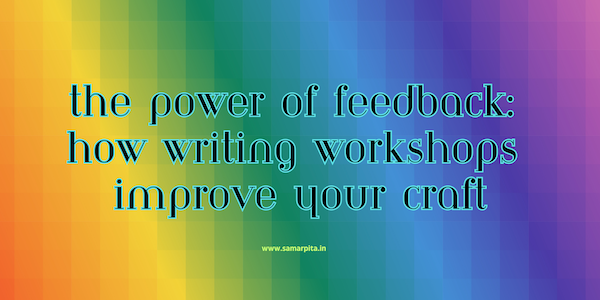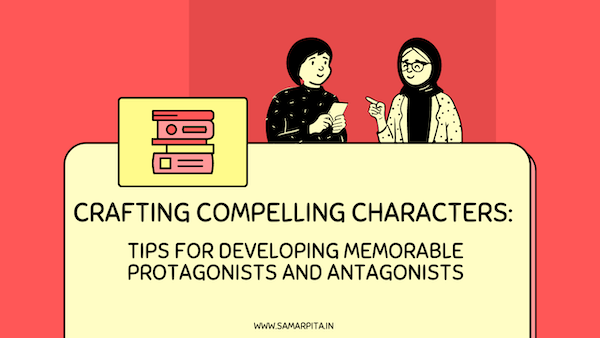Writing is often seen as a solitary endeavor, with authors toiling away in their own creative worlds. However, one aspect of the writing process that should never be overlooked is the power of feedback. This is where writing workshops come into play. These collaborative environments provide authors with the opportunity to receive constructive criticism, learn from fellow writers, and ultimately improve their craft. In this blog post, we will explore the importance of feedback in writing workshops and how they can significantly enhance an author’s skills.
Also Read: Freelance Editing: How to Get Started
The Value of Constructive Criticism
Writing workshops offer a unique space where authors can receive honest and constructive feedback on their work. This feedback is invaluable as it provides a fresh perspective and helps identify areas that may need improvement. By opening themselves up to critique, authors gain insight into how their writing is perceived by others, helping them grow as storytellers.
Learning from Fellow Writers
Writing workshops bring together a diverse group of writers, each with their own unique styles and perspectives. By participating in these workshops, authors have the opportunity to learn from their peers. Engaging in discussions, observing different writing techniques, and hearing different voices can broaden an author’s horizons and inspire new ideas. The collective knowledge and experiences of the group can be a tremendous resource for personal growth and development.
Also Read: The Role of an Editor in the Publishing Process: A Guide for Writers
Identifying Strengths and Weaknesses
In a writing workshop, not only do authors receive feedback, but they also gain a deeper understanding of their own strengths and weaknesses. Through the eyes of fellow writers, authors can identify the aspects of their writing that shine and the areas that may need further attention. This self-awareness is crucial in honing one’s craft and allows authors to focus their efforts on areas that require improvement.
Refining the Editing Process
Writing workshops also play a vital role in the editing process. As authors receive feedback and suggestions from their peers, they gain valuable insights into how their work can be refined. This feedback helps authors identify inconsistencies, plot holes, or weak characterizations that they might have overlooked. The collaborative nature of workshops allows authors to polish their manuscripts before submitting them for publication or further revision.
Also Read: 5 Ways To Land Clients When Starting As A Freelance Writer
Building Confidence and Support
Writing can often be a solitary and lonely journey. However, writing workshops provide a supportive and nurturing environment. Authors can find solace in the fact that they are not alone in their struggles and triumphs. The encouragement and camaraderie of fellow writers in the workshop can boost an author’s confidence, helping them overcome self-doubt and continue to pursue their writing goals.
Conclusion
In the world of writing, the power of feedback should never be underestimated. Writing workshops offer a platform where authors can receive constructive criticism, learn from others, and develop their skills. Through feedback, authors gain new perspectives, identify strengths and weaknesses, refine their editing process, and build confidence. Engaging in writing workshops is a crucial step in an author’s journey toward improvement and success. So, embrace the power of feedback and take advantage of the valuable opportunities that writing workshops provide.
Also Read: A to Z of Writing and Editing – #BlogchatterA2Z 2023
Incorporating feedback from others is a crucial aspect of the writing process. Writing workshops provide authors with a supportive and collaborative environment to receive constructive criticism, learn from fellow writers, and develop their craft. By embracing feedback and engaging in workshops, authors can refine their skills, identify strengths and weaknesses, and ultimately grow as storytellers. So, don’t underestimate the power of feedback and make the most of writing workshops to enhance your writing journey.
***
If you are looking for an excellent manuscript editor, someone to create content for your business, or an expert to help build your personal or professional brand on social media, then look no further and connect with me at editor@samarpita.in I can be followed on instagram at @samarpita and on twitter at @samarpitadotin.
***********
Read my ebook WRITE. EDIT. PROMOTE. to learn the basics about becoming an author – from writing your own book, to editing your first draft, and to promoting your book yourself! You can also read my ebook How To Write A Story Effectively and learn some valuable lessons about how a story can go from average to extraordinary. This book is part 1 of the series.
In fiction, I have two short stories for children in an ebook called Bedtime Stories.



